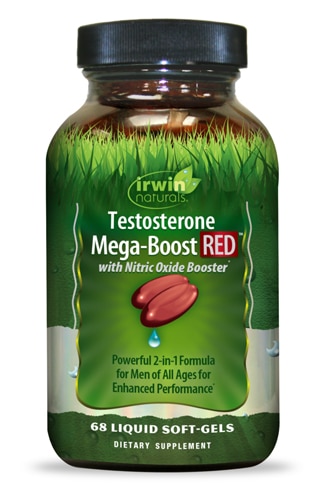Whether we like to admit it or not, a man’s body naturally starts to change as he gets older — although there are certainly steps he can take to keep himself healthy.
Once a man passes his 30s, he’s likely to start producing less
collagen, the protein that acts like a natural “scaffolding material” which holds the body together, while his production of testosterone will also likely start to dwindle over the following decades. Additionally, men in their 40s, 50s and beyond are more prone to developing issues like high blood pressure, high blood sugar and certain
nutrient decencies.

So what’s a man to do? In addition to eating a nutrient-dense diet, exercising and getting enough sleep — all essential components of a healthy lifestyle — certain
supplements can help support men during different stages of life. Below you’ll find our top picks for protein, vitamin and mineral supplements that can benefit men from their 20s through their 80s.
Health Tips for Men: Supplements for Each Decade
1. In your 20s & 30s:
- Quality multivitamin — According to a recent nutrition report released by the Centers for Disease Control and Prevention in the U.S, about 10% of the entire S. population likely has at least one or more nutrition deficiencies, including younger people in their 20s and 30s.
The most common deficiencies include those in these vitamins and minerals: vitamin B12, magnesium, vitamin A and D, iron, zinc and folate.
While a varied, healthy diet may be able to supply all the nutrients you need, issues like digestive problems, medications and genetics can leave you susceptible to falling short in some vitamins and minerals, which is why taking a quality
multivitamin can be a wise ”insurance plan.” You can start taking a multi in your 20s, but keep at it as you get older, since most provide antioxidant vitamins like A, C and E that help fight free radical damage (also called oxidative stress), which speeds up the aging process.
For the most “bang for your buck,” choose one that’s
fermented and made from real foods, which supports absorption. Bonus points if take a multivitamin that’s also rich in supportive superfoods and adaptogens like ashwagandha, turmeric, ginger, ginseng and medicinal mushrooms.
- Probiotics— No matter your age, there’s a strong connection between the health of your gut and your overall wellness. Probiotics, or the “good bacteria” that populate your gut microbiome, have many important roles — such as supporting digestion, nutrient assimilation, immune function, body weight and even mental health. †
Eating probiotic rich foods (such as yogurt,
sauerkraut and kimchi) and taking a daily probiotic supplement is a good strategy for keeping harmful bacteria in check, while supporting growth of the types you want to thrive. There are dozens of probiotic supplements available, but for help with absorption and utilization, consider taking a
SBO (soil-based organism) probiotic which contains bacteria that are capable of effectively making their way through your GI tract.
2. In your 40s & 50s:
- Collagen protein — Collagen is the most abundant protein in the human body, helping to form to connective tissues including the skin, joints, tendons and the lining of the GI tract. Once adults reach their 40’s they begin making less collagen, and unfortunately this decline only continues with older age (especially if someone lives an unhealthy lifestyle).
Collagen protein powders supply you with amino acids that help your body to carry out functions such as building and maintaining muscle tissue, repairing damaged cartilage and joints, healing skin, and strengthening the gut lining. This is important if you want to hold onto muscle and bone strength, to prevent aches and pains, and to prevent early signs of aging on your skin.
†
- Vitamin D — Because the human body makes vitamin D only with help from sunlight (and to a lesser extent from certain foods), a high percentage of people of all ages today are deficient in this vitamin, since an “indoor lifestyle” (think desk jobs and long commutes) is so common. It’s estimated that a whopping 40 to 90 percent of adults in the U.S (depending on their skin color) are suffering from vitamin D deficiency.
Having adequate levels of vitamin D is important for your bones, immune system, cognitive function, production of hormones like testosterone and for mood, meaning that it’s imperative to bring your level up if you’re running low. Taking a vitamin D3 supplement (the more active and bioavailable form) and spending more time outdoors in the sun is the best way to help prevent a deficiency.
†
3. In your 60s, 70s & Beyond
- Magnesium — Given how many functions magnesium is involved in, including supporting heart health, nerve signaling, muscle contractions and digestion, it’s a shame so many people don’t get enough of this key mineral.
When you run low in this essential electrolyte you may be more likely to deal with issues such as: headaches, muscle spasms, irregular blood pressure, digestive issues and restlessness.
While men of all ages can benefit from getting plenty of magnesium, older men might be more at risk of deficiency due to factors like malabsorption, use of some medications, excessive alcohol consumption, diabetes, and low intake of fruits and veggies. Supplementing can be an easy and effective way to ward off aches and pains, trouble sleeping and even constipation.
†
- Omega-3s — These anti-inflammatory fatty acids, which are found naturally in foods like salmon and sardines, are supportive of cardiovascular and cognitive health, and may help to keep your mood lifted and weight in check too. †
We need
omega-3 fats to counteract the effects of omega-6s, which are highly prevalent in the modern day diet. Ideally adults should consume a ratio of omega-6s to omega-3s that’s between about 2:1 to 4:1, however there’s evidence that many men may be consuming up to 10 times more omega-6s than this!
Since older men are most prone to developing heart disease, dementia and other health concerns tied to high levels of inflammation, now’s the time to supplement and/or increase your intake of omega-3 foods.
- Zinc — When you think of immune-supporting nutrients, vitamin C probably comes to mind, but did you know that zinc is another immunity powerhouse?
Zinc promotes healthy immune function in part by helping to regulate the survival, proliferation and maturation of immune cells. It may even offer protection against certain diseases. Because the older population is usually most at risk for experiencing serious complications due to infections and viruses, it’s a smart idea for older men to up their zinc and antioxidant intake (such as vitamins C, A and E).
†
†These statements have not been approved by the Food and Drug Administration. These products are not intended to diagnose, treat, cure or prevent disease.
 So what’s a man to do? In addition to eating a nutrient-dense diet, exercising and getting enough sleep — all essential components of a healthy lifestyle — certain supplements can help support men during different stages of life. Below you’ll find our top picks for protein, vitamin and mineral supplements that can benefit men from their 20s through their 80s.
So what’s a man to do? In addition to eating a nutrient-dense diet, exercising and getting enough sleep — all essential components of a healthy lifestyle — certain supplements can help support men during different stages of life. Below you’ll find our top picks for protein, vitamin and mineral supplements that can benefit men from their 20s through their 80s.



